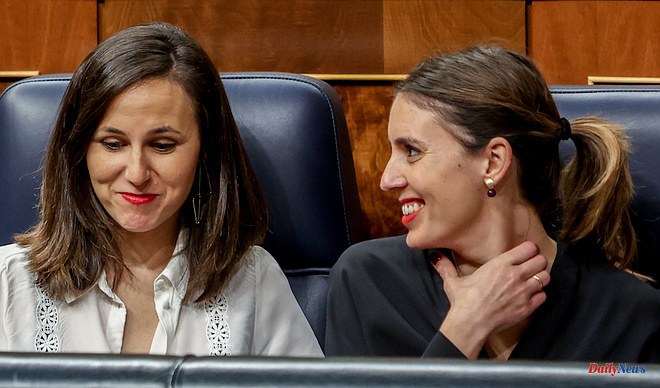The Congress of Deputies is preparing to open the way to correct the star law of the Minister of Equality, Irene Montero. The law of yes is yes, approved by the Council of Ministers and later ratified in Congress with the votes of the two parties that support the Government and its allies, embarks on a new path to be modified.
Today the positions change and the majority of the Chamber, with surprising alliances and under the auspices of the majority partner of the Executive, chooses to amend a norm that has caused more than seven hundred sentence reductions and dozens of releases of sexual offenders. And it does so by seriously dividing the coalition government and cracking the investiture bloc to the point that the socialist representative has charged against United We Can: "We are tired of your rants."
The deputy and secretary of Equality of the PSOE, Andrea Fernández, has assured that the objective of her party is to "protect" the victims and "eradicate" sexual violence and consequently "assumes responsibility and leadership" to change a law that considered "good for many reasons" but, at the same time, he said, "it is evident that the law is not working properly" and for this reason it is necessary to "correct the errors that have caused pain in the victims, alarm in society and that the PSOE deeply regrets".
"Slogans are not worth here," stressed the representative of the PSOE. "To those who try to ridicule the PSOE's service record in matters of feminism, I warn you that they are making a fool of themselves," she said, alluding to the PP. And to United We Can, the socialist deputy has dedicated a forceful phrase: "We are tired of your perorations."
Those darts have been received live by Irene Montero, sitting on the blue government bench accompanied only by her partner and friend Ione Belarra, attached to her. Yolanda Díaz has not come to support the Minister of Equality in this duel, nor have other ministers of United We Can. One of the images of the day.
Unidas Podemos has replied to its government partner by going to the shock. He has accused him of "allying with Vox and PP to return to the Penal Code of La Manada and the probationary ordeal of women. This is what beats in his reform."
Lucía Muñoz, on behalf of the purple group, has assured that "today's applause when the PSOE proposal is approved will be the applause of shame." And she has added: "Consent is not touched. Only yes is yes."
The deputy of United We Can has accused the PSOE of "betraying" women by allying "with a handful of fascists" and has stressed on two occasions: "We are going to defend feminist conquests here and in the streets."
The PP has taken advantage of the division in the Government and the unwanted effects of the law to lash out harshly against the Executive and to question whether tomorrow, after the cross attacks, life can continue "absolutely the same" in the coalition. "Yes, you can, of course you can, you can resign," Cuca Gamarra told Irene Montero, paraphrasing the slogan of Podemos. "Yes you can, of course you can, you can stop", she continued after addressing the PSOE bench in reference to the minister. The general secretary of the PP has emphasized that she has to "assume responsibilities." Especially, she has had an impact, "when we talk about a law that has generated so much pain and rejection to society" and whose fault she blames on the President of the Government because "this is the law of Pedro Sánchez."
Gamarra has highlighted that the yes is yes debate is an "amendment" to the way of governing of this Executive, which he has described as "frivolous" and "arrogant". In addition, he has linked that it was the fault of his "ideological sectarianism" that he ignored the warnings about the consequences of the law. Just as he has linked the reaction now of the PSOE to the effect of attrition in the polls of voting intention.
The PP spokeswoman has refuted Podemos's excuses about consent or that the application of the law is being done wrong because the judges are "fachas".
ERC, one of the Executive's priority partners, has regretted that this debate comes just before 8-M. His deputy Pilar Vallugera has recalled that there have been sentence reductions and releases and that the modification proposed today will not be able to solve any of those that have already occurred.
The Catalan independence party has not hesitated to charge against the judges who continue to have a "patriarchal" vision when it comes to applying the laws. Her deputy has accused both socialists and purples of "having broken everything" and, specifically, she has reproached the PSOE for having "bought the framework of the right."
EH Bildu, another regular partner of the coalition government, has chosen to side with the Ministry of Equality and Unidas Podemos and will not support the proposal for a socialist law to rectify the rule. Her deputy, Bel Pozueta, has praised the law, highlighting its positive aspects and has preferred to focus on the "objective" that, in her opinion, "have the rights" and which is none other than raising penalties. Pozueta has blamed the judges for making an erroneous interpretation of the law and has advocated introducing "small technical changes" into it that do not affect the heart of the rule: "consent." For Bildu, addressing the rectification of the law "from the hand of the right" is "a bad start."
The PNV has asked to "react" acknowledging that with regard to penalties, the law of yes is yes has generated "deep social confusion." Basque nationalists defend amending it without touching everything positive that it includes. They believe that a higher penalty should be added in each modality of the crime when it includes violence, intimidation or affects minors. "This is not a return to the Penal Code of the herd but an adjustment in the penalties," said his spokesman Mikel Legarda, for whom the time has come to "repair the social upheaval generated" by the reduction in sentences. "This law," he said, "has not been shared by the citizens or by the victims."
From Ciudadanos it has been insisted that Montero's law has produced an "unwanted effect." The oranges advocate "rectifying" supporting the socialist proposal although, they maintain, "it is late." Ciudadanos has asked to process the PSOE proposal through the urgent procedure. A very similar position has been held by the representative of the Canary Islands Coalition, Ana Oramas.
PDeCAT also supports the reform, although it regrets the confrontation that has arisen between the two government parties. The opposite position is the one that JxCAT will maintain, which will vote 'no' to the rectification.
Vox, which is committed to abstention as a way of facilitating consideration, has taken advantage of its turn to speak to charge against the "infectious ideology" of the Government, but also against the PP for "putting a candle to God and another to the devil" and "buy all the junk on the left." "They are responsible for each sexual crime that the released prisoners comment on," the deputy Carla Toscano has launched to the Executive, who has branded the Council of Ministers as "the most harmful and detrimental" for women.
According to the criteria of The Trust Project












